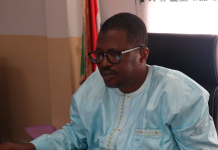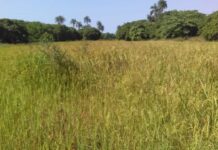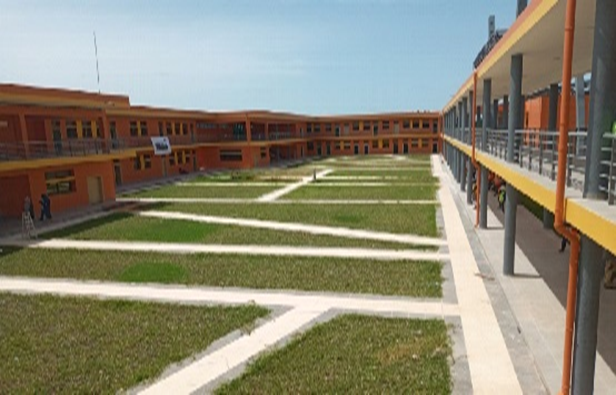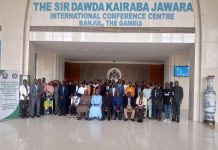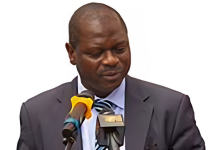By Yankuba Jallow with New Narratives
Two decades after a government crackdown on student protestors left 14 young people dead, tension is once again mounting on university campuses. At the heart of the unrest is a familiar grievance say experts: the absence of a credible, independent mechanism for students to air their concerns.
Students say a recent crackdown on a student protest at the University of The Gambia (UTG) underscores the urgency of the need. Civil society organisations and student leaders say that The Gambia is again failing its youth.
“The country’s response to student activism is reactionary and often heavy-handed,” said Buba Jallow, who participated in a 2024 protest at the University of The Gambia which prompted the current crisis. “This sends a dangerous message to students: that raising your voice will either be ignored or suppressed.”
In December students at UTG staged a protest over the controversial dismissal of two senior lecturers. The protest, sparked by the firing of Dr. Alieu Gibba and Professor Matarr Njie—both of whom had publicly accused the university administration of nepotism and mismanagement—was stifled before it could gain momentum. The students were denied a permit to march. Under Gambian laws, the Public Order Act gives the Inspector General of Police the authority to grant permission for a demonstration. The Inspector General also decides the timing and manner in which the demonstration will be held.
The Vice Chancellor declined to accept their petition without giving any reasons. Personnel from the Gambia Police Force were dispatched to the campus. A tense standoff ensued with students demanding that the Vice Chancellor come out of his office and receive the petition from them. The protest started in the morning and only ended in the evening when students sat down on the open floor demanding that the Vice Chancellor meet them. The police officers attempted to push the students out of the university, but the students resisted. Eventually, the Vice Chancellor came out and received the petition, and the students dispersed. There was no violence, but advocates, remembering violence of the past, said it was a sign that the Truth, Reconciliation and Reparations Commission recommended that a student complaint mechanism is needed urgently.
According to Ousman Jassey, a former president of the university’s Students’ Union, without a formal complaint mechanism, students are currently left to navigate a cumbersome triangle of institutional channels: the Directorate of Student Affairs, the Senate, and the university’s Governing Council to voice displeasure with university decisions. While these bodies exist in theory to address student concerns, in practice, he says, they are often constrained by conflicts of interest and bureaucratic inertia.
“When matters affect the university’s image or management directly, they’re rarely given serious attention,” Jassey said. “This is why we need an independent complaints body—outside the university—protected by legislation.”
The Truth Commission set up to address human rights abuses under the former dictatorship of Yahya Jammeh, agrees. Among its 2021 recommendations, following its years-long inquiry, was the creation of a dedicated mechanism to handle student grievances—one that would prevent future tragedies like those of April 2000, when peaceful student protests were met with deadly force. Fourteen people were killed in the crackdown by Jammeh’s military forces including a journalist and a toddler.
Yet, nearly four years after the Truth Commission submitted its final report, the recommendation remains unimplemented.
It is not the first incident since the elected government of Adama Barrow took over from Jammeh in 2016. Jassey recalls how, during a 2021 standoff with university authorities over a prolonged staff strike, the student union had to escalate its complaints directly to the Office of the President after both the university and the Ministry of Higher Education failed to act.
“That should never happen in a functional democracy,” he said. “In other countries, students don’t have to write to the Office of the President to solve basic problems.”
The Ministry of Higher Education, Research, Science and Technology is tasked with implementing the Truth Commission’s recommendation. Minister Pierre Gomez defended the existing system and said there are adequate measures in place to address students’ complaints. He said students should be made aware of them and use them to advance their grievances through proper channels.
“We have the Directorate of Student Affairs, the Senate and the Governing Council,” Gomez said. “The President and the Vice President of the Students’ Union sit in the highest decision-making body of the University.”
Gomez said the students are involved in the decision-making process of the university. “The Senate and the Governing Council are the highest decision-making bodies of the University, and they are represented there.”
The Minister also pointed to the University of The Gambia’s newly established Centre of Excellence for Transitional Justice and Sustainable Peace as a critical part of ongoing reforms. The Centre is one of four Centres of Excellence approved by the university’s Governing Council in August 2022, designed to advance knowledge and practice in key developmental areas. Specifically, the Centre for Transitional Justice and Sustainable Peace aims to contribute to human and institutional capacity development, policy formulation, and applied research in the fields of justice and peacebuilding, becoming a regional leader in thought and practice on transitional justice. It aligns directly with the goals of The Gambia’s transitional justice process and seeks to reinforce the implementation of the Truth Commission’s recommendations.
Previously led by Dr. Baba Galleh Jallow, the former head of the Truth Commission, no one has been appointed to replace him since his resignation in 2023. Some university students interviewed said they are not aware of the existence of the Centre. Sources within the ranks of the university said the centre only exists in name as of now. The centre, as of now, still has not had a replacement for Dr Jallow. A source at the university said they have already rolled out advertisements for people to apply for the vacant position.
Meanwhile, the atmosphere at the university remains tense. Videos circulated on social media show students chanting outside the administrative block, some holding placards demanding justice for the dismissed lecturers, others calling for reform of the university governance system. In the footage, security personnel can be seen trailing the demonstrators closely.
Observers say the danger lies not in the protests themselves, but in the state’s failure to engage. “Suppressing protest does not make it disappear,” said a lecturer at the University who spoke on condition of anonymity because he fears reprisal. “It only builds pressure beneath the surface.”
As The Gambia continues its fragile transition from autocracy to democracy, students are once again testing the limits of the system.
This story was a collaboration with New Narratives as part of the West Africa Justice Reporting Project.

